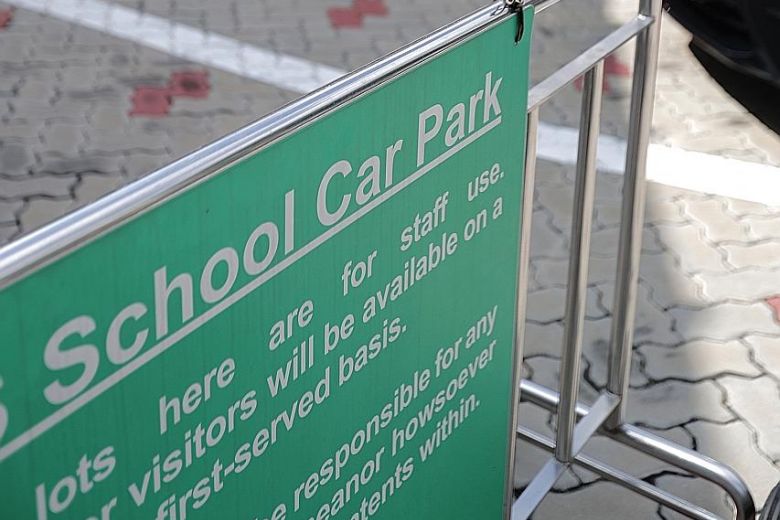Parking charges for teachers stem from system of checks and balances: Ong Ye Kung
Sign up now: Get ST's newsletters delivered to your inbox

Free parking for staff in education institutions was flagged by the Auditor-General's Office (AGO) in 2015 for going against the civil service's clean wage policy.
ST PHOTO: KELVIN CHNG
SINGAPORE - The decision to charge teachers for parking is borne out of a public duty to abide by a "system of internal self-discipline", Education Minister Ong Ye Kung said in a Facebook post on Friday (May 25).
Free parking for staff in education institutions was flagged by the Auditor-General's Office (AGO) in 2015 for going against the civil service's clean wage policy - that of not paying a public servant hidden benefits beyond his salary.
"This finding went against years of MOE practice. Yet we have to respect our internal system of checks and balances. We cannot pick and choose which (AGO) finding to address or comply with - we take them all seriously," Mr Ong wrote.
"This is about upholding the value of self-discipline."
Mr Ong was responding to a speech made in Parliament last week by Marine Parade GRC MP Seah Kian Peng, who called for a shift away from looking at issues through an economic lens.
Mr Seah, whose speech was widely shared on social media, said using the clean wage system to justify parking charges in schools "implies that all the years of free parking had tarred teachers with an 'unclean' wage".
Adding that charging for parking "sits uncomfortably" with him, he noted the sacrifices teachers had been making over the years without counting dollars and cents.
On Friday, Mr Ong said he had thanked Mr Seah personally for speaking up for teachers.
"I also told him I agreed with him that we should never allow ourselves to see things from a purely economic lens," he said.
Governance and running a public service system is not always about taking a purist market-based approach, Mr Ong added, citing examples such as how land use is planned not just for economic purposes, but for social, community and environmental ends as well.
"Perhaps for the same reason, for a long time, we didn't charge parking for teachers in schools and servicemen in camps," he said.
However, there are checks and balances within Singapore's governance system, he added. In the case of the annual AGO report, the checks pertain to the use of public funds. The observations and findings by AGO are "published and subject to parliamentary scrutiny", he noted.
The issue of teachers not paying for parking in schools first came under the spotlight in 2015, when the AGO report faulted some educational institutions for allowing their staff to park for free, or at fees below the market rate.
In response, the authorities discussed the issue with educators and sought their understanding on how to address the finding, Mr Ong said. It culminated in the decision to implement parking charges in schools from August this year.
Defending the clean wage policy, Mr Ong wrote on Friday: "The whole public service subscribes to the discipline of having a clean wage, so every public officer knows that his salary is all he gets - there are no hidden benefits.
"This is one of our core practices to ensure a clean government. As Kian Peng said, clean wage surely must be a moral idea. Indeed, it is."
Moreover, the free parking benefit, he noted, was being given "just to one group of teachers" - those who drive.
That said, charging teachers for parking "does not diminish our appreciation of teachers and educators", stressed Mr Ong.
He added: "I am heartened to see so many people coming forward to express their appreciation of teachers.
"As Kian Peng said, it is a reminder about the kind of conversations and discourses we should be having. That policy decisions should be grounded not just on economics, but more importantly on values, morals, and public duty."


